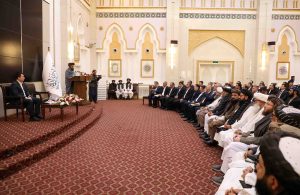The Taliban asked Uzbekistan to lower transit fees for cargo moving through the Central Asian country while praising the bilateral relationship and airing anticipation of increasing Afghan exports.
The topic arose during the visit of a high-level Uzbek delegation to Kabul in late October.
Uzbek Deputy Prime Minister Jamshid Khojaev led a delegation to the Afghan capital on October 29-30. According to reporting from Gazeta.uz, he was accompanied by Minister of Energy Zhurabek Mirzamahmudov, Minister of Transport Ilham Makhkamov, Minister of Water Resources Shavkat Hamraev, Minister of Mining and Geology Bobir Islamov, Minister of Agriculture Ibrahim Abdurakhmonov, Special Representative of the President for Afghanistan Ismatulla Irgashev, and others, including a sizable group of business representatives.
Trade and transit were the top-line items for the visit, alongside cooperation in a range of related sectors, including railways, mines, water management, and even educational opportunities in Uzbekistan for Afghans.
The Taliban side was led by Deputy Prime Minister for Economic Affairs Mullah Abdul Ghani Baradar. According to a Taliban government readout of the meeting, Baradar “underlined Afghanistan’s commitment to serving as a pivotal transit point in the region.”
He “praised the balanced trade relations between Afghanistan and Uzbekistan and anticipated a significant increase in Afghan exports to Uzbekistan. In light of this, he encouraged Uzbekistan to consider special preferential tariffs and friendly trade interactions.”
Kun.uz reported that a joint working group had been formed to analyze the fee structures in place. According to comments to Kun.uz by Uzbek Ministry of Transport press secretary Navruz Ashurmatov, an agreement was reached to set up a working group “with the aim of comparing the amounts of fees and payments collected from national carriers on the territory of the two states, discussing and finding solutions to existing problems in the field of cargo transportation with the participation of carriers of the two states, [and] responsible government bodies.”
For his part, per the Taliban readout, Khojaev expressed Uzbekistan’s readiness to collaborate with Afghanistan and reportedly revealed a “trade route map” aimed at boosting Afghanistan’s exports to Uzbekistan, “with the goal of increasing the trade volume between the two countries to approximately $3 billion” from the current level of around $600 million. Khojaev noted Uzbek plans to simplify visa procedures for Afghan entrepreneurs and drivers, as well as plans to open a business center in Termez to cater to Afghan businesses.
What’s perhaps most remarkable is just now normal relations between the Taliban and Uzbekistan are, despite the reality that no government – including Tashkent – has officially recognized the Taliban regime following its ascent to power in August 2021. That remains a technicality on the international stage, one clearly not impeding cooperation across the border where mutual interests meet.
Nevertheless, there remain points of contention in the Afghanistan-Uzbekistan relationship, particularly regarding the Qosh Tepa canal. The canal aims to divert water from the Amu Darya – a transboundary river that forms part of Afghanistan’s northern borders with Tajikistan, Uzbekistan, and Turkmenistan – and will arguably affect the whole parched region. Uzbekistan is expected to dispatch a delegation by the end of the year to discuss the project more fully with the Taliban.
As Niginakhon Saida noted in a report earlier this year, “Kabul is not part of any transboundary water agreements with its northern neighbors.” And in September, Uzbek President Shavkat Mirziyoyev, speaking at an Aral Sea-focused meeting in Dushanbe, noted that a “new participant” in the realm of water use in the region had appeared – an oblique reference to the Taliban. Uzbekistan’s approached to the canal project appears measured, not dismissing the project altogether but clearly seeking to pull the Taliban into consultative processes regarding water sharing in the region and perhaps slow the project down to fully consider the impacts.
Uzbekistan’s concerns about water may pair well with the Taliban’s concerns about transit fees, providing room for negotiation in which each side may get some of what it wants from the other.

































